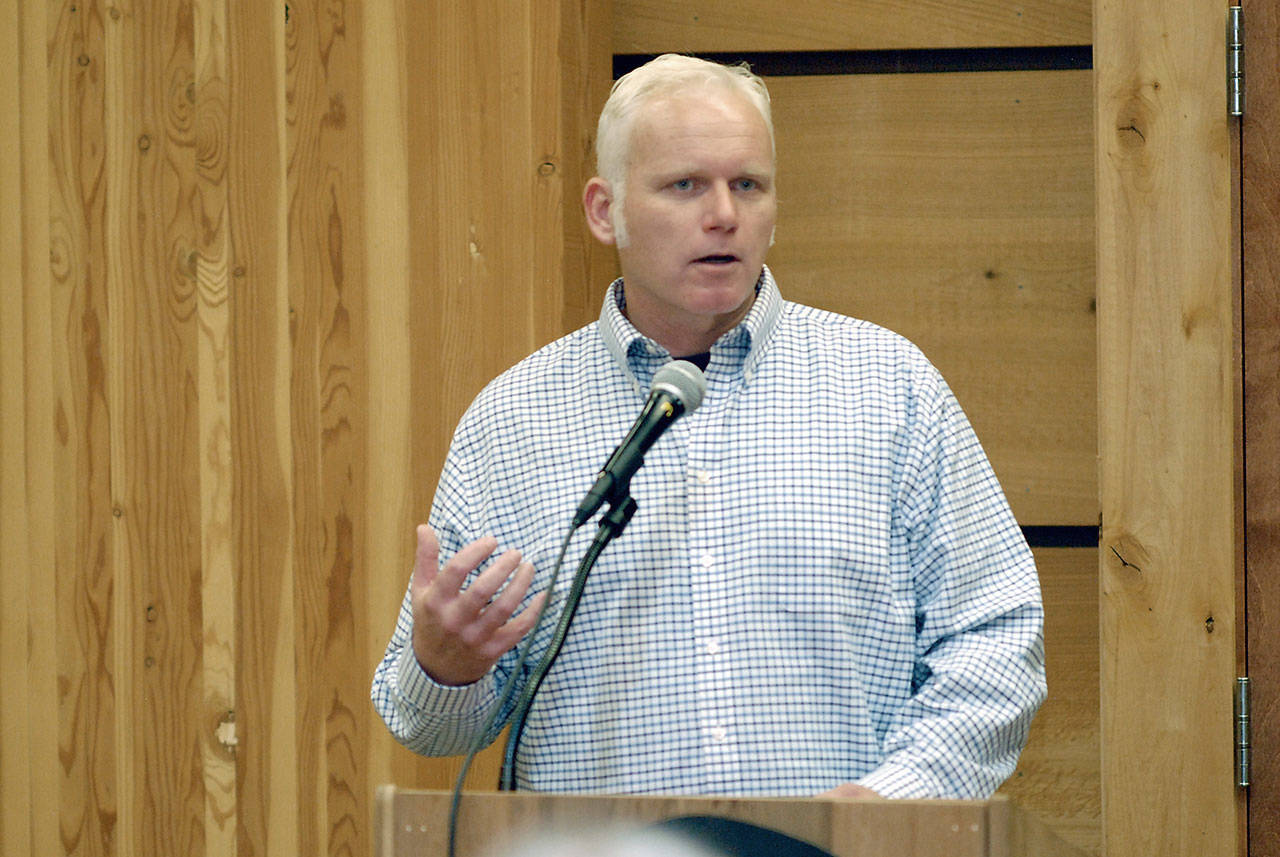From U.S. presidents to Pacific Northwest football coaches, the 24th District’s state representatives gave examples of leadership — both good and bad — in a summit with high school students on Sept. 17.
State Sen. Kevin Van De Wege, state Reps. Mike Chapman and Steve Tharinger and Peninsula College President Luke Robins addressed about 40 Port Angeles and Sequim high school class officers at the college’s Longhouse building.
The 24th District covers the North Olympic Peninsula and northern Grays Harbor County.
“The most important thing, I feel, to be a good leader is to listen to the people you lead,” said Van De Wege, D-Sequim.
Van De Wege said President Donald Trump has a different leadership style.
“President Trump and a lot of his followers are very devout, but where he fails is he fails to admit that he makes mistakes and he fails to accept criticism,” Van De Wege said, adding that Trump’s leadership has resulted in high turnover in key cabinet positions.
“I think he’s a good example of somebody to watch and to be open and honest and say it can be done better, or it can be done in a different way,” Van De Wege said.
Tharinger, D-Port Townsend, used former President Lyndon Johnson as an example of effective leadership.
“He knew what made each senator tick,” Tharinger said, referring to Johnson’s time as senate majority leader.
“He knew what they needed for their (state), and he also created in a lot of ways the politics of ‘I’ll get you a hospital if I can get your vote for civil rights.’ ”
Tharinger said Bill Ruckelshaus, the first director of the U.S. Environmental Protection Agency with whom he served on the Washington state Salmon Recovery Funding Board, had an “amazing” ability to build consensus, bring people to the table and listen to their concerns.
“When we were building up the salmon recovery for the whole state, his whole effort was ‘We’re not going to be top-down here,’ ” said Tharinger, a former Clallam County commissioner.
“ ‘We’re going to listen to you.’ ”
The Salmon Recovery Funding Board was structured to allow stakeholders in each watershed to provide on-the-ground knowledge, resulting in greater “buy-in” from its members, Tharinger said.
“As leaders, I think that’s important to make sure that we build those relationships and listen and care,” Tharinger said.
“You may not always agree — you certainly won’t always agree — but having that understanding, having that basic fundamental human contact and understanding I think is really important to build on, and to lead and create solutions for the challenges we face.”
Robins used his opening remarks to debunk common myths about leadership, including notions that leaders must be extroverts, know everything, never show weakness and don’t make mistakes.
“Sometimes we have in our heads these sort of myths about what a good or a great leader is or is not,” said Robins, who became Peninsula College president in 2012.
“So I want to hopefully explode maybe seven of those, or at least get you to think about them a little bit.”
After a lunch break, the students were scheduled to hear a legislative briefing on basic education funding and have a question-and-answer session with the lawmakers.
Chapman, D-Port Angeles, said good leaders use social media as a positive.
He said Seattle Seahawks Coach Pete Carroll, Apple CEO Tim Cook and University of Washington football Coach Chris Petersen each use Twitter effectively.
“One thing you will never see from a Pete Carroll tweet is he’ll never call out a player,” Chapman said.
“He will never say the right tackle missed that key block. He will never say that the general manager didn’t give him the players that he needed to win that week.
“He will never tweet out a negative comment about the city of Seattle, about the fans, about the media, about the ownership group,” Chapman added, raising his cellphone.
“Pete Carroll knows the power that he holds by virtue of his position in leadership and this little device that he carries around.”
Cook, Chapman said, would never criticize Apple’s board of directors or engineers on social media.
“Chris Petersen does not tweet out negative things, negative comments,” Chapman said.
“He does not throw people under the bus. Chris Petersen is a leader.
“The great leaders of our society, they know that they use this for positive,” Chapman added.
“They know they use it to build up their team, to build up their organization. They don’t use it to tear others down, make others look small, to belittle others.”
Chapman, who also served as a Clallam County commissioner prior to becoming a state representative, said social media can be “more positive than negative.”
“But I’m afraid that in today’s society, too many leaders are using this to be more negative than positive,” Chapman told the students.
“And I’m asking you, your generation, to change that. As you move forward in your leadership, change this tool to be a positive.”



